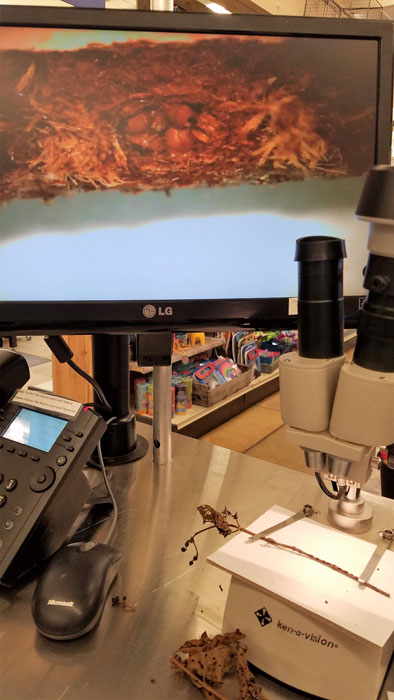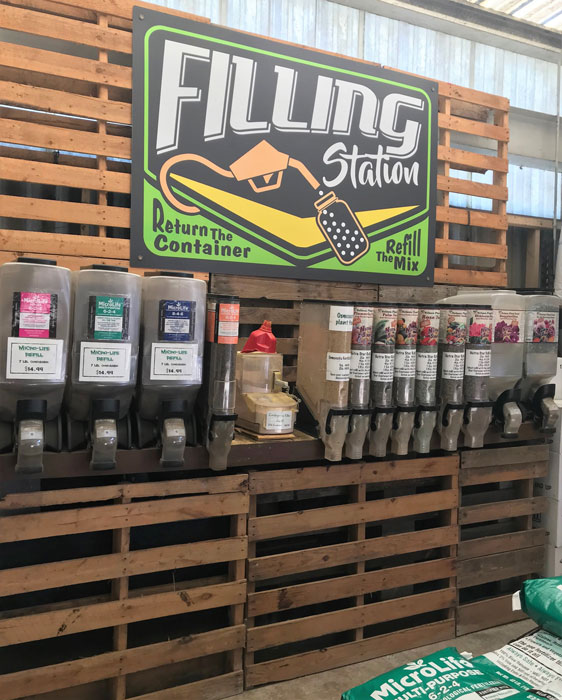4/1/2019
Curating the Plant Pharmacy
Diana Stoll
Independent garden centers should consider the manner of which they sell fertilizers, fungicides and insecticides as another way to set itself apart from box store competition. Recommending the soil amendments or fertilizers that help a customer’s plants grow bountifully or beautifully builds her confidence as a gardener and trust in the garden center. Diagnosing and providing solutions to fight off a pest or disease wounding her prized plants is another way to become her gardening partner.
What to Choose
Whether it’s called a Plant Pharmacy, Plant Health Care Center, Plant Clinic or nothing at all, it starts with products, chosen for customer preferences or owner values. At Chalet Nursery & Garden Center in Wilmette, Illinois, a broad selection of national brand products—from synthetic to organic—is available. When a pest or disease is diagnosed, staff gives cultural remedies first, and then the benefits and drawbacks of both chemical and organic methods of treatment.
“Then we let customers choose according to their own philosophies or lifestyles without guilt or judgement,” says Jennifer Brennan, Horticulture Information Specialist and Manager of Education.
Concerned about pollution in the waterways affecting salmon health, the customers at West Seattle Nursery in Seattle, Washington, prefer organic products. The Natural Gardener in Austin, Texas offers organic solutions exclusively. Organics outsell chemical options at Plants for All Seasons in Houston, Texas, too.

Determining Price & Value
Some independents consider prices charged at box stores when setting their own prices; others don’t. “Although the margin of profit may be less than other categories in the garden center, it doesn’t have to be as low as distributor reps may encourage,” according to Sid Raisch. He warns, “Garden centers are not doing themselves a favor with lowering profit margins.”
Victor Flaherty, Owner of Plants for All Seasons, agrees and maintains a profit margin of more than 50%. One way he achieves this is by carrying local brands.
“We are lucky to be in a city with local suppliers of excellent products that box stores don’t use,” he says.
An impressive space and diagnostic technology contribute to the success of selling garden pharmaceuticals at Chalet. Specimens magnified under a microscope and displayed on a monitor wow customers as Jennifer uses a prescription pad with Chalet’s logo at the top to record the plant’s name, diagnosis of the problem and control options.
Jennifer also uses customer samples to train the rest of the staff. Specimens are bagged and tagged to use as teaching tools. She’s always at the microscope from 1:00 to 2:00 p.m. April through October, but in peak season she may be there from 9:00 a.m. to 6:00 p.m., answering customer questions and recommending products.
Pictured: Jennifer Brennan of Chalet Nursery & Garden Center projects images from a microscope onto a monitor when advising customers.
Using Space Wisely
Space-challenged garden centers use product positioning to their advantage. West Seattle Nursery displays their products on a 20-ft. long wall of shelves behind the cash registers. Customers head to the cashiers with their questions.
“Linda, the head cashier, is super knowledgeable,” says Tree & Shrub Buyer Diane Simpson. “The diagnostics often start with her and she asks for help from plant specialists if she needs it.”
Chalet employs signage as additional, silent salespeople. Their Chalet Recommends signs point out top sellers and share the reasons a customer might want to purchase them. In contrast, Victor “spends more than he probably should” on labor to ensure there’s always a staff member available to advise customers.
Additional Tips & Strategies
Plants for All Seasons uses handouts titled “Recipes for Success.” These recipes list the ingredients needed and growing instructions for specific types of plants. For example, the recipe for growing a rose includes a soil amendment and rose fertilizer. It also mentions solutions for controlling pests and diseases in case they’re needed. Located by the plants, recipes are easy for customers to pick up with their plants.
Garden centers often rely on word-of-mouth to market their ability to solve garden challenges.
“At West Seattle Nursery, we are known for our great customer service,” Diane states proudly. Plants for All Seasons takes advantage of advertising paid by suppliers on a local gardening radio show. The host is an advocate of independent garden centers and talks about control products on the show.
Garden centers receive many phone calls from customers needing help with their plants. While diagnosing a pest or disease on the phone can be difficult, encourage them to email photos or send messages through Facebook. Then post the photo, diagnosis and solution on all the garden center’s social media channels to position the garden center as the community’s gardening expert.

Getting Creative
Creative independents find additional ways to increase sales of garden solutions. The Filling Station at Plants for All Seasons keeps customers coming back. Both organic and synthetic fertilizers are sold in wide-mouth jars. When they’ve used all the fertilizer, they bring the jar back and refill it for a discounted price.
“The trick to making this work,” Victor says, “is finding suppliers that sell their products in wide mouth jars and larger, economically-priced packages for us to fill the gravity-fed bins.” Customers feel great about recycling the jar and saving money, and the garden center maintains the same profit margins—a win for everyone.
Pictured: The Filling Station at Plants for All Seasons encourages customers to come back again and again.
Smart independents turn problems into opportunities to serve their customers and make money. When soil webworms attacked Houston lawns a couple years ago, Plants for All Seasons posted a video to social media that went viral locally and brought in customers from 30 to 40 miles away.
“If there were 18 cars in the parking lot, 17 of them were there for help with soil webworms,” Victor said.
The Viburnum leaf beetle is an unwelcome newcomer to the Chicagoland area and customers bring samples infested with the pest to Chalet. Jennifer shows customers the strips of eggs (magnified, of course), explains their life cycle, why they’re so destructive and recommends controls. “I love the gross stuff—the ooies and gooies,” she laughs.
If you’re not using your Plant Pharmacy as an opportunity to set your garden center apart from the competition, plan to in the upcoming season. Train your staff to recommend products that help your customers be better gardeners and welcome the chance to solve their problems. In return, you can earn loyal customers.
Diana Stoll worked for 20 years in a garden center, 12 of which were as a manager. She’s now a freelance writer who writes a weekly gardening column for the Chicago Daily Herald and for a variety of other garden and news publications. Read her blog at www.gardenwithdiana.com and email her at diana@gardenwithdiana.com.